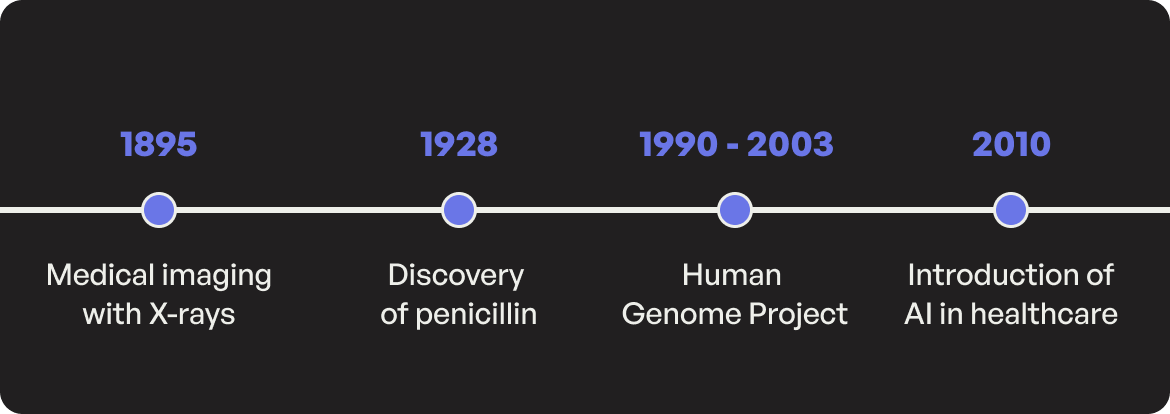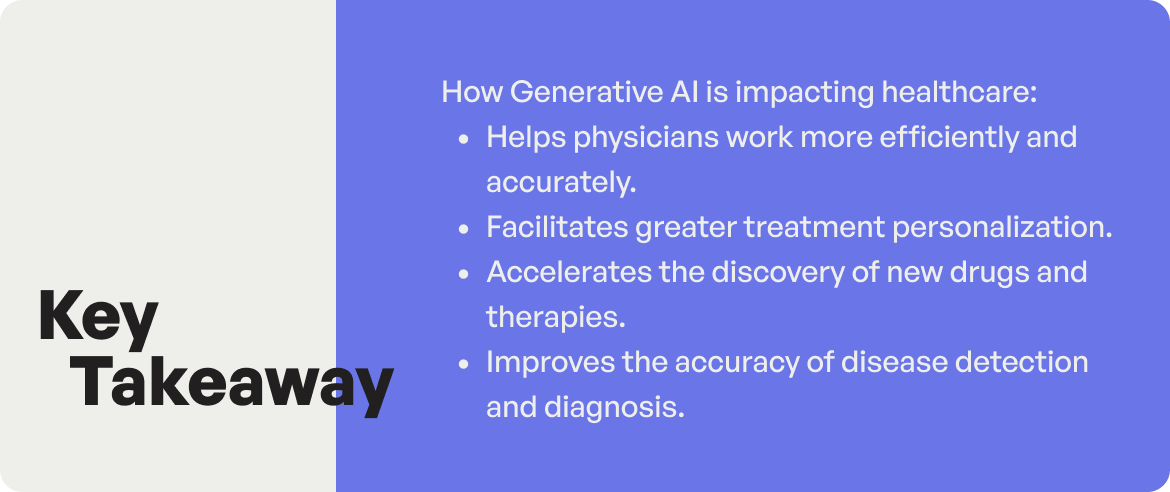🤖 Generative AI in Medicine: The Revolution We’re Not Ready For - by Alan Brande
By Light-it, in collaboration with Alan Brande, Founder and CEO at Light-it, Co-founder at Puppeteer, Co-founder at CompliantChatGPT, General Partner at Enlighten Capital.
Throughout its history, medicine has been both a witness to and a beneficiary of technological revolutions that have radically transformed how we understand and treat human health. From the advent of medical imaging with X-rays in 1895, which enabled non-invasive observation inside the body, to milestones like the discovery of penicillin in 1928, revolutionizing infection treatment and saving countless lives, and the monumental Human Genome Project from 1990 to 2003, which reshaped our understanding of human genetics and paved the way for personalized medical treatments.
Medicine has undergone significant transformations due to technological advancements. In some cases, these transformations have been so impactful that they led to paradigm shifts in how medicine and the human body are conceived. Today, we stand at the threshold of one of the most important revolutions in healthcare history: the era of Artificial Intelligence (AI).
The introduction of AI in healthcare is not a recent phenomenon. Its initial applications date back to around 2010 when the US FDA—responsible for regulating the safety and efficacy of medical products—began adapting its regulations to avoid hindering technological progress. These adaptations have allowed for the development and implementation of AI technologies in various areas of medicine, such as imaging, where significant advancements in 3D reconstruction and medical image analysis have been achieved.
More recently, in the 2020s, a wave of AI innovation materialized known as Generative Artificial Intelligence (Generative AI or GenAI). Starring, to a large extent, companies like OpenAI and its flagship product, ChatGPT, which have gained significant global popularity over the past two years. This popularity is partly due to these technologies' ability to solve general problems and, more importantly, their accessibility, allowing anyone, regardless of technical expertise, to use them. These tools enable the generation of text, audio, images, and more by using natural language instructions—almost as if you were giving instructions to another person. For instance, these tools can assist with mundane tasks like creating a grocery list for making empanadas or more complex ones, such as helping diagnose a disease. Many individuals and industries benefit from using Generative AI tools, and healthcare is not only no exception but is, in my opinion, one of the industries poised to benefit the most.
Generative AI is already making a profound and transformative impact on healthcare today. This technology is exemplified by virtual assistants or "medical copilots" that help physicians work more efficiently and accurately. For instance, EPIC, the leading US provider of electronic health record (EHR) systems, uses such assistants to quickly access and synthesize patient medical histories, medical publications, and other relevant information. This aids doctors in tasks like differential diagnoses for patients with atypical symptoms, treatment planning, and administrative duties such as recording consultation details or retrieving specific details about patient histories—all using natural language.
These systems not only enhance the efficiency of clinical decision-making but also contribute to greater personalization of treatment. For example, they can analyze real-time health data, considering factors like a patient’s genetics, lifestyle, and responses to previous treatments, to suggest more suitable and personalized therapeutic options.
Moreover, Generative AI plays a key role in medical research, accelerating the discovery of new drugs and therapies. How? AI can identify patterns and connections often inaccessible through traditional research methods by analyzing large datasets from research studies and clinical trials. This not only speeds up the research process but also opens new avenues for understanding and treating complex diseases.
In the medical imaging field, Generative AI has significantly improved the accuracy of disease detection and diagnosis. Advanced algorithms can analyze medical images, such as MRIs or CT scans, identifying abnormalities with a precision that sometimes surpasses human capability. This is particularly critical in the early detection of diseases like cancer, where early intervention can be key to successful treatment.
The Promise and Perils of Generative AI in Modern Medicine
Although significant progress has been made in problem-solving and task execution with AI tools, there remains a substantial gap when comparing these tools to the human brain, despite their superiority in performing specific tasks. However, this gap continues to narrow over time, and the evolution of Generative AI may one day allow it to surpass human intelligence in executing any task. This would usher in what is known as Artificial General Intelligence (AGI). When this happens, it will be possible to train AI models the same way physicians are trained but across all specialties, using all available medical information updated in real-time. This could make high-quality healthcare universally accessible, affordable, and immediate through virtual doctors.
The future of healthcare will be digital and universally accessible. Although we are still far from this ideal, technological advancements—particularly AI implementation—bring us closer with each passing day. While this vision is highly optimistic, it raises numerous ethical and practical questions:
What will the role of medical professionals be?
To what extent should we allow technology to make critical healthcare decisions, and who will be accountable for its errors?
Can a machine ever truly understand and empathize with human suffering as a person can?
These and many other questions remain unanswered. However, the most important innovations always bring challenges when it comes to widespread adoption and standardization. Yet, the status quo is disrupted when the benefits are significant enough, paving the way for progress.








Really interesting post! Especially the idea of AGI and how it will impact healthcare. I wonder: will AGI ever manage communication with patients directly? And more importantly, will it cook better empanadas than my grandma?